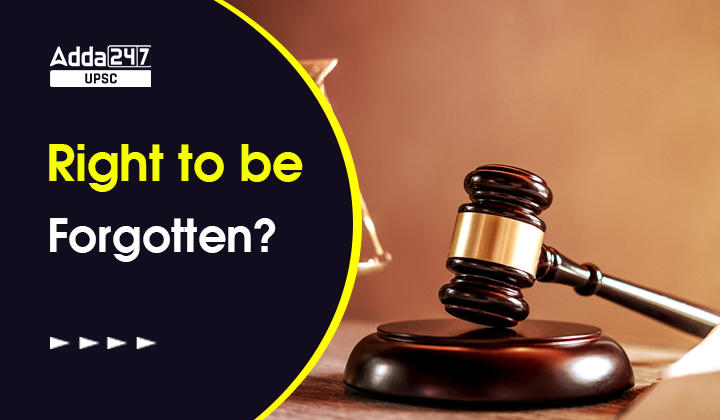Table of Contents
Right to be Forgotten?
In This Article, ”Right To Be Forgotten? About, Origin, Cases”, We Will Discuss: What Is Right To Be Forgotten?, Law In India On Right to be Forgotten?, How Court’s Handled Right to be Forgotten so far?, etc.
Right To Be Forgotten In News?
The Issue: Recently, a doctor(Dr. Ishwarprasad Gilda) brought up the ‘Right to be Forgotten’ in the Delhi High Court after a wrongful arrest in response to a fabricated FIR against him which he claims is causing detriment to his life and personal liberty.
How Was The Court Responded? The Delhi High Court will hear the doctor’s plea on March 15 for enforcement of his ‘Right to be Forgotten’.
What Will The Court Do? The enforcement in present scenario will include, the removal of news articles and other incriminating content related to his wrongful arrest in response to a fabricated FIR against.
Right to be Forgotten |EXPLAINED|
What is the Issue?
The Case Against The Doctor?
- In Dr. Ishwarprasad Gilda vs. Union of India & Others, a practicing doctor who is a “world-renowned figure in the fight against HIV-AIDS” was accused illegally procuring medicines from abroad and administering them to HIV patients in India, who he was also accused of “mishandling”.
- When one of the patients, Girdhar Verma, passed away, the petitioner contends he was wrongfully arrested on April 23, 1999, and was subsequently given bail on May 11, 1999.
- Thereafter, relying on a trial court order from August 4, 2009, exonerating him, he reiterated that there was no evidence of him having engaged in any illegality.
- Thus, the doctor approached the Delhi High Court seeking directions to the respondents like Google, the Press Information Bureau, and the Press Council of India to remove all “irrelevant” news content causing “grave injury” to his reputation and dignity or to pass any other order or direction to safeguard his dignity, including availing his “Right to be Forgotten.”
What Is The Right To Be Forgotten?
Right to be Forgotten
- The “Right to be Forgotten” is the right to remove or erase content so that it’s not accessible to the public at large.
- It empowers an individual to have information in the form of news, video, or photographs deleted from internet records so it doesn’t show up through search engines, like Google.
Origins of Right to be Forgotten
- The Right to be Forgotten originates from the 2014 European Court of Justice ruling in a case where it was codified for the first time following a Spanish man’s quest to make the world forget a 1998 advertisement saying “his home was being repossessed to pay off debts.”
Law In India On Right to be Forgotten?
- Section 43A of the Information Technology Act, 2000 says that organizations who possess sensitive personal data and fail to maintain appropriate security to safeguard such data, resulting in wrongful loss or wrongful gain to anyone, may be obligated to pay damages to the affected person.
- While, the IT Rules, 2021 do not include this right, they do however, lay down the procedure for filing complaints with the designated Grievance Officer so as to have content exposing personal information about a complainant removed from the internet.
| Important Fact
On December 11, 2019, the Ministry of Electronics and Information Technology introduced the Personal Data Protection Bill in the Lok Sabha. While this bill is yet to be passed by the parliament, owing to a parliamentary joint committee’s suggestion to amend 81 of the 99 sections of the same, Clause 20 under Chapter V of the draft bill titled, “Rights of Data Principal” mentions the “Right to be Forgotten” as the right to restrict or prevent the continuing disclosure of personal data by a “data fiduciary”. |
How Court’s Handled Right to be Forgotten so far?
Equivalent To Right to Privacy: While the right is not recognized by a law or a statute in India expressly, the courts have repeatedly held it to be endemic to an individual’s Right to Privacy under Article 21 since the Apex Court’s 2017 ruling in “K.S.Puttaswamy vs Union of India”.
What Was K.S.Puttaswamy vs Union of India Case?
- In this case, a nine-judge bench, including CJI Chandrachud, referred to the European Union Regulation of 2016 which recognized “the right to be forgotten” an individual’s right to remove personal information from the system when “he is no longer desirous of his personal data to be processed or stored” or when “its no longer necessary, relevant, or is incorrect and serves no legitimate interest”.
- However, the court also recognized that such a right can be restricted by the right to freedom of expression and information or “for compliance with legal obligations”, or for the performance of tasks in the public interest or on “grounds of public interest in the area of public health” or “scientific or historical research purposes or statistical purposes, or for the establishment” and “exercise or defense of legal claims”.
Jorawer Singh Mundy vs Union of India Case?
- In “Jorawer Singh Mundy vs Union of India”, an American citizen approached the Delhi High Court in 2021 seeking the removal of all publicly available records of a case registered against him under the Narcotics Drugs and Psychotropic Substances Act, 1985.
- He argued that although the trial court acquitted him back in 2011, he was unable to find a job in the United States on account of a quick Google search showing the judgment in his case.
- Despite a good academic record, this prejudiced his chances of employment, he argued. Thus, the court directed respondents like ‘IndianKanoon’ to remove the same.



 TSPSC Group 1 Question Paper 2024, Downl...
TSPSC Group 1 Question Paper 2024, Downl...
 TSPSC Group 1 Answer key 2024 Out, Downl...
TSPSC Group 1 Answer key 2024 Out, Downl...
 UPSC Prelims 2024 Question Paper, Downlo...
UPSC Prelims 2024 Question Paper, Downlo...




